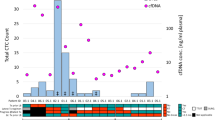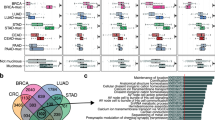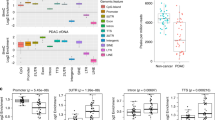Abstract
Loss of heterozygosity (LOH) on chromosome 18q21 is frequently found in various human cancers, suggesting the presence of tumour suppressor gene(s) in this chromosomal region. DCC is the most likely target of LOH because loss or reduction of DCC expression has been found in many types of cancers. However, few reports have focused on sequence mutations of this gene. We investigated sequence mutations and expression of DCC in primary gastric cancers. We studied mutations in 25 of the 29 DCC exons by PCR-SSCP in 17 primary gastric cancers exhibiting LOH on 18q21. No mutations of DCC were found in any of the tumours, although 78% (47/60) of the primary tumours showed apparent loss or reduction of DCC expression by immunohistochemistry. Analysis of methylation status of DCC revealed that methylation frequently occurred in both primary tumours (75%; 45/60) and corresponding non-cancerous gastric mucosae (72%; 43/60). Methylated status of DCC was significantly correlated with the loss of DCC expression in primary tumours (P < 0.01). These results indicate that DCC is frequently silenced, probably by epigenetic mechanisms instead of sequence mutations in gastric cancer. http://www.bjcancer.com © 2001 Cancer Research Campaign
Similar content being viewed by others
Article PDF
Change history
16 November 2011
This paper was modified 12 months after initial publication to switch to Creative Commons licence terms, as noted at publication
References
Ahuja N, Li Q, Mohan AL, Baylin SB and Issa JP (1998) Aging and DNA methylation in colorectal mucosa and cancer. Cancer Res 58: 5489–5494
Baylin SB, Herman JG, Graff JR, Vertino PM and Issa JP (1998) Alterations in DNA methylation: a fundamental aspect of neoplasia. Adv Cancer Res 72: 141–196
Cho KR, Oliner JD, Simons JW, Hedrick L, Fearon ER, Preisinger AC, Hedge P, Silverman GA and Vogelstein B (1994) TheDCCgene: structural analysis and mutations in colorectal carcinomas. Genomics 19: 525–531
Deng G, Chen A, Hong J, Chae HS and Kim YS (1999) Methylation of CpG in a small region of thehMLH1promoter invariably correlates with the absence of gene expression. Cancer Res 59: 2029–2033
Endoh Y, Tamura G, Watanabe H, Ajioka Y and Motoyama T (1999) The common 18-base pair deletion at codons 418–423 of theE-cadheringene in differentiated-type adenocarcinomas and intramucosal precancerous lesions of the stomach with the features of gastric foveolar epithelium. J Pathol 189: 201–206
Fearon ER, Cho KR, Nigro JM, Kern SE, Simons JW, Ruppert JM, Hamilton SR, Preisinger AC and Thomas G (1990) Identification of a chromosome 18q gene that is altered in colorectal cancers. Science 247: 49–56
Fleisher AS, Esteller M, Wang S, Tamura G, Suzuki H, Yin J, Zou TT, Abraham JM, Kong D, Smolinski KN, Shi YQ, Rhyu MG, Powell SM, James SP, Wilson KT, Herman JG and Meltzer SJ (1999) Hypermethylation of thehMLH1gene promoter in human gastric cancers with microsatellite instability. Cancer Res 59: 1090–1095
Graff JR, Herman JG, Myohanen S, Baylin SB and Vertino PM (1997) Mapping patterns of CpG island methylation in normal and neoplastic cells implicates both upstream and downstream regions in de novo methylation. J Biol Chem 272: 22322–22329
Hahn SA, Schutte M, Hoque AT, Moskaluk CA, da Costa LT, Rozenblum E, Weinstein CL, Fischer A, Yeo CJ, Hruban RH and Kern SE (1996) DPC4a candidate tumor suppressor gene at human chromosome 18q21.1. Science 271: 350–353
Herman JG, Graff JR, Myohanen S, Nelkin BD and Baylin SB (1996) Methylation-specific PCR: a novel PCR assay for methylation status of CpG islands. Proc Natl Acad Sci U S A 93: 9821–9826
Herman JG, Umar A, Polyak K, Graff JR, Ahuja N, Issa JP, Markowitz S, Willson JK, Hamilton SR, Kinzler KW, Kane MF, Kolodner RD, Vogelstein B, Kunkel TA and Baylin SB (1998) Incidence and functional consequences ofhMLH1promoter hypermethylation in colorectal carcinoma. Proc Natl Acad Sci U S A 95: 6870–6875
Hiltunen MO, Alhonen L, Koistinaho J, Myohanen S, Paakkonen M, Marin S, Kosma VM and Janne J (1997) Hypermethylation of theAPC(adenomatous polyposis coli) gene promoter region in human colorectal carcinoma. Int J Cancer 70: 644–648
Ikeda Y, Mori M, Kamakura T, Haraguchi Y, Saku M and Sugimachi K (1994) Increased incidence of undifferentiated type of gastric cancer with tumor progression in 912 patients with early gastric cancer and 1245 with advanced gastric cancer. Cancer 73: 2459–2463
Kataoka M, Okabayashi T and Orita K (1995) Decreased expression ofDCCmRNA in gastric and colorectal cancer. Surg Today 25: 1001–1007
Kohno T and Yokota J (1999) How many tumor suppressor genes are involved in human lung carcinogenesis?. Carcinogenesis 20: 1403–1410
Kong XT, Choi SH, Inoue A, Xu F, Chen T, Takita J, Yokota J, Bessho F, Yanagisawa M, Hanada R, Yamamoto K and Hayashi Y (1997) Expression and mutational analysis of theDCC DPC4andMADR2/JV18-1genes in neuroblastoma. Cancer Res 57: 3772–3778
Kuismanen SA, Holmberg MT, Salovaara R, Schweizer P, Aaltonen LA, de La Chapelle A, Nystrom-Lahti M and Peltomaki P (1999) Epigenetic phenotypes distinguish microsatellite-stable and -unstable colorectal cancers. Proc Natl Acad Sci U S A 96: 12661–12666
Maesawa C, Tamura G, Suzuki Y, Ogasawara S, Sakata K, Kashiwaba M and Satodate R (1995) The sequential accumulation of genetic alterations characteristic of the colorectal adenoma-carcinoma sequence does not occur between gastric adenoma and adenocarcinoma. J Pathol 176: 249–258
Miyake S, Nagai K, Yoshino K, Oto M, Endo M and Yuasa Y (1994) Point mutations and allelic deletion of tumor suppressor geneDCCin human esophageal squamous cell carcinomas and their relation to metastasis. Cancer Res 54: 3007–3010
Nishizuka S, Tamura G, Maesawa C, Sakata K, Suzuki Y, Iwaya T, Terashima M, Saito K and Satodate R (1997) Analysis of theDPC4gene in gastric carcinoma. Jpn J Cancer Res 88: 335–339
Nishizuka S, Tamura G, Terashima M and Satodate R (1998) Loss of heterozygosity during the development and progression of differentiated adenocarcinoma of the stomach. J Pathol 185: 38–43
Schmitt CA, Thaler KR, Wittig BM, Kaulen H, Meyer zum Buschenfelde KH and Dippold WG (1998) Detection of theDCCgene product in normal and malignant colorectal tissues and its relation to a codon 201 mutation. Br J Cancer 77: 588–594
Stirzaker C, Millar DS, Paul CL, Warnecke PM, Harrison J, Vincent PC, Frommer M and Clark SJ (1997) Extensive DNA methylation spanning the Rb promoter in retinoblastoma tumors. Cancer Res 57: 2229–2237
Tamura G (1996) Molecular pathogenesis of adenoma and differentiated adenocarcinoma of the stomach. Pathol Int 46: 834–841
Tamura G, Kihana T, Nomura K, Terada M, Sugimura T and Hirohashi S (1991) Detection of frequentp53gene mutations in primary gastric cancer by cell sorting and polymerase chain reaction single-strand conformation polymorphism analysis. Cancer Res 51: 3056–3058
Tamura G, Sakata K, Maesawa C, Suzuki Y, Terashima M, Satoh K, Sekiyama S, Suzuki A, Eda Y and Satodate R (1995) Microsatellite alterations in adenoma and differentiated adenocarcinoma of the stomach. Cancer Res 55: 1933–1936
Tamura G, Sakata K, Nishizuka S, Maesawa C, Suzuki Y, Iwaya T, Terashima M, Saito K and Satodate R (1996a) Inactivation of theE-cadheringene in primary gastric carcinomas and gastric carcinoma cell lines. Jpn J Cancer Res 87: 1153–1159
Tamura G, Sakata K, Nishizuka S, Maesawa C, Suzuki Y, Terashima M, Eda Y and Satodate R (1996b) Allelotype of adenoma and differentiated adenocarcinoma of the stomach. J Pathol 180: 371–377
Tamura G, Yin J, Wang S, Fleisher AS, Zou T, Abraham JM, Kong D, Smolinski KN, Wilson KT, James SP, Silverberg SG, Nishizuka S, Terashima M, Motoyama T and Meltzer SJ (2000) E-Cadheringene promoter hypermethylation in primary human gastric carcinomas. J Natl Cancer Inst 92: 569–573
Toyota M, Ahuja N, Suzuki H, Itoh F, Ohe-Toyota M, Imai K, Baylin SB and Issa JP (1999) Aberrant methylation in gastric cancer associated with the CpG island methylator phenotype. Cancer Res 59: 5438–5442
Tsuchiya T, Tamura G, Sato K, Endoh Y, Sakata K, Jin Z, Motoyama T, Usuba O, Kimura W, Nishizuka S, Yin J, Fleisher AS, Zou T, Kong D and Meltzer SJ (2000) Distinct methylation patterns of twoAPCgene promoters in normal and cancerous gastric epithelia. Oncogene 19: 3642–3646
Uchino S, Tsuda H, Noguchi M, Yokota J, Terada M, Saito T, Kobayashi M, Sugimura T and Hirohashi S (1992) Frequent loss of heterozygosity at theDCClocus in gastric cancer. Cancer Res 52: 3099–3102
Wu MS, Shun CT, Wang HP, Sheu JC, Lee WJ, Wang TH and Lin JT (1997) Genetic alterations in gastric cancer: relation to histological subtypes, tumor stage, and Helicobacter pylori infection. Gastroenterology 112: 1457–1465
Yoshida Y, Itoh F, Endo T, Hinoda Y and Imai K (1998) DecreasedDCCmRNA expression in human gastric cancers is clinicopathologically significant. Int J Cancer 79: 634–639
Author information
Authors and Affiliations
Rights and permissions
From twelve months after its original publication, this work is licensed under the Creative Commons Attribution-NonCommercial-Share Alike 3.0 Unported License. To view a copy of this license, visit http://creativecommons.org/licenses/by-nc-sa/3.0/
About this article
Cite this article
Sato, K., Tamura, G., Tsuchiya, T. et al. Frequent loss of expression without sequence mutations of the DCC gene in primary gastric cancer. Br J Cancer 85, 199–203 (2001). https://doi.org/10.1054/bjoc.2001.1888
Received:
Revised:
Accepted:
Published:
Issue date:
DOI: https://doi.org/10.1054/bjoc.2001.1888
Keywords
This article is cited by
-
Isolated brachioradialis metastasis of gastric adenocarcinoma after R0 resection
World Journal of Surgical Oncology (2021)
-
Selective depletion of tumour suppressors Deleted in Colorectal Cancer (DCC) and neogenin by environmental and endogenous serine proteases: linking diet and cancer
BMC Cancer (2016)
-
MAD1 (mitotic arrest deficiency 1) is a candidate for a tumor suppressor gene in human stomach
Virchows Archiv (2007)
-
Epigenetic inactivation of the candidate tumor suppressor gene HOXB13 in human renal cell carcinoma
Oncogene (2006)
-
Clinicopathological significance of loss of heterozygosity in intestinal- and solid-type gastric carcinomas: a comprehensive study using the crypt isolation technique
Modern Pathology (2006)



